Stay up to date via the EDRi-gram
Published since 2003, twice a month, the EDRi-gram newsletter collects and summarises the most important digital rights news from across our network around Europe
EDRi-gram newsletters
-

EDRi-gram, 27 November 2025
What has the EDRi network been up to over the past few weeks? Find out the latest digital rights news in our bi-weekly newsletter. In this edition: Digital Omnibus rolls back rights, age verification misses the mark, data workers behind AI, & more!
Read more
-

EDRi-gram, 13 November 2025
What has the EDRi network been up to over the past few weeks? Find out the latest digital rights news in our bi-weekly newsletter. In this edition: Halloween is over… but digital rights horrors remain
Read more
-

EDRi-gram, 29 October 2025
What has the EDRi network been up to over the past few weeks? Find out the latest digital rights news in our bi-weekly newsletter. In this edition: we're pondering digital fairness, budget cuts for the Austrian DPA and more.
Read more
-

EDRi-gram, 16 October 2025
What has the EDRi network been up to over the summer? Find out the latest digital rights news in our bi-weekly newsletter. In this edition: Digital protection at stakes – and how we are fighting back.
Read more
-

EDRi-gram, 17 September 2025
What has the EDRi network been up to over the summer? Find out the latest digital rights news in our bi-weekly newsletter. In this edition: age verification gains traction, EU’s deregulation spree risks entire digital rulebook, & more!
Read more
-

EDRi-gram, 10 July 2025
What has the EDRis network been up to over the past two weeks? Find out the latest digital rights news in our bi-weekly newsletter. In this edition: European Commission must champion the AI Act, EDRi pushes back against risky GDPR deregulation, & more!
Read more
-

EDRi-gram, 25 June 2025
What has the EDRis network been up to over the past two weeks? Find out the latest digital rights news in our bi-weekly newsletter. In this edition: The case for a spyware ban, EDRi 2025-2030 strategy, EU must reassess Israel’s adequacy status, & more!
Read more
-

EDRi-gram, 12 June 2025
What has the EDRis network been up to over the past two weeks? Find out the latest digital rights news in our bi-weekly newsletter. In this edition: UK data adequacy under scrutiny, ProtectEU strategy a step further towards digital dystopia, and more!
Read more
-

EDRi-gram, 28 May 2025
What has the EDRis network been up to over the past two weeks? Find out the latest digital rights news in our bi-weekly newsletter. In this edition: Reopening the GDPR is a threat to our rights, 6 years of fighting censorship by Meta in Poland, & more!
Read more
-

EDRi-gram, 7 May 2025
What has the EDRis network been up to over the past two weeks? Find out the latest digital rights news in our bi-weekly newsletter. In this edition: Apple & Meta fined for breaching DMA, civil society urges EU to act against Hungary’s pride ban, & more!
Read more
-

EDRi-gram, 16 April 2025
What has the EDRis network been up to over the past two weeks? Find out the latest digital rights news in our bi-weekly newsletter. In this edition: Challenging data retention regime in Poland, Ljubljana’s municipal surveillance, and more!
Read more
-

EDRi-gram, 2 April 2025
What has the EDRis network been up to over the past two weeks? Find out the latest digital rights news in our bi-weekly newsletter. In this edition: DSA complaint X, New civic coalition for journalists and civil society, imagining EU-topia, & more!
Read more
-

EDRi-gram, 5 March 2025
What has the EDRis network been up to over the past two weeks? Find out the latest digital rights news in our bi-weekly newsletter. In this edition: Our call to reject the Europol reform, UK and France launch fresh attacks on encryption, & more!
Read more
-

EDRi-gram, 19 February 2025
What has the EDRis network been up to over the past two weeks? Find out the latest digital rights news in our bi-weekly newsletter. In this edition: Commission withdraws ePrivacy proposal, new database to track investigations into Big Tech, & more!
Read more
-

EDRi-gram, 5 February 2025
What has the EDRis network been up to over the past two weeks? Find out the latest digital rights news in our bi-weekly newsletter. In this edition: Don’t let Big Tech bully the EU, Commission’s AI Act guidelines should center human rights, & more!
Read more
-

EDRi-gram, 22 January 2025
The EDRi-gram is back after the winter break and yes, we missed you too. Before we dive into the new year, we have a review of 2024 for you. From stopping Chat Control to hosting the first-ever Tech and Society Summit, read up on what kept EDRi so busy last year. In this edition, also catch-up with some important developments from the end of 2024 which are bound to pop up again on the digital rights radar soon. The infamous High Level Group Going Dark presented their "insecurity by design agenda". So don’t be surprised if EU politics sees another iteration of flawed proposals on data retention and circumventing encryption. Ugh. Meanwhile, the European Commission presented their proposal for digitalising travel documents. “Didn’t they promise that for the third quarter of 2023,” you say? Indeed, but after the initiative received a devastating amount of negative feedback, it took more than a year for the adjusted EU travel app proposal. We provide an extensive analysis of the (so far) voluntary system for pre-travel controls. For our more masochistically inclined readers, we take a look over to the US and how corporate social media such as Meta and X align with the new administration. Recent changes to content moderation policies empower far-right extremists and expose marginalised and minoritised communities to hate speech.
Read more
-

EDRi-gram, 4 December 2024
This week, a new college of European Commissioners was confirmed by the European Parliament. Together with a broad civil society coalition, we welcomed them with our collective vision for EU policy that puts technology in the public interest. This call-to-action for the new leadership is crucial, given the worrying Commissioners' hearings in the European Parliament. Their focus on corporate and security interests steeped in, wrapped in a harmful logic of constant growth and control. Below, you can also read our main takeaways from the Commissioners' hearings. It was a mixed bag that reiterated the importance of our efforts towards achieving digital justice. More, we share a critical analysis of the EU's twin transition in times of crises, and its connection to green extractivism and militarisation. Romania has also been on our minds this week – with an unexpected extremist candidate winning the first round of the presidential elections. Civil society in Romania is ringing the alarm about the role that TikTok played in amplifying an existing democracy deficit and social issues, how the tech platform relates to DSA obligations, and what the EU and national authorities can do about it. Finally, EDRi's Executive Director Claire Fernandez is preparing for a leadership transition in 2025. Join us in thanking Claire for her dedication and impact, while reading some reflections below.
Read more
-

EDRi-gram, 20 November 2024
For the last two weeks, we’ve been tuning in to the European Commissioner-designates’ hearings in the European Parliament to hear how would-be EU decision-makers in the Commission envision the role of technology in our future. Some hearings were riveting, while others deeply worrying. It was encouraging to hear that the enforcement of existing digital laws like the GDPR and DSA was high on some Commissioner-designates’ priorities. However, there were also many disturbing mentions of tech hype buzzwords, and no strong commitments to tackle surveillance or protect our right to safe and confidential communications online through encryption. This month, our neighbours across the Atlantic have been reeling from the results of their Presidential election. However, we’re worried about more than just that when it comes to the US. A decade after Snowden’s revelations, and despite continuing privacy concerns, surveillance and mass data collection continue under the EU-US Data Privacy Framework. And the EU appears to be willing to compromise our rights for geopolitical and economic gains.
Read more
-

EDRi-gram, 24 October 2024
With winter almost on our doorstep, we're warming up for a busy few months in the EU digital rights space. In early November, we'll be paying close attention to the European Parliament hearings of the Commissioner-designates selected by Ursula Von Der Leyen. Earlier this month, the European Commission unveiled its highly anticipated Digital Fairness Fitness Check report. The report is likely to have a major influence on the Commission’s planned Digital Fairness Act proposal, which will affect our digital rights. Let’s unpack this together. Protection of young people online should be achieved through empowerment not exclusion. This is the highlight of our and our members' submission to the European Commission’s call for evidence for the Digital Services ActArticle 28 guidelines for the protection of minors online. This month, we also co-hosted – along with 41 other civil society organisations – the Tech and Society Summit. A first-of-its-kind space when we're inundated with industry-sponsored events, the summit created a bridge between civil society and new policymakers, to achieve accountable, people-focused policies that advance everyone’s digital rights.
Read more
-

EDRi-gram, 9 October 2024
Last week, we gathered with hundreds of EU decision-makers, Members of European Parliament, civil society representatives and journalists at the Tech and Society Summit in Brussels. As one of the 41 co-organisers of the Summit, we were inspired by the visionary ideas in the various panels, discussions and chat – all towards centering people, the planet and democracy in the EU tech agenda. Stay tuned for more highlights and recordings from the day. One of the main takeaway from the Summit was that systems of control and surveillance – which are becoming increasingly central to EU policies – will not make us safer. Nowhere is this more apparent than at Europe’s own borders where technology is being used to dehumanised migrants. Read the blog by Access Now’s Caterina Rodelli who travelled across Greece to see first-hand how this is happening. On a positive note, the infamous “Chat Control” proposal is dead and buried again – for now. And we have the Dutch to thank for this positive development! We have more details for you.
Read more
-

EDRi-gram, 25 September 2024
With summer on its way out, there might be a chill in the air. But there’s none to be found in Brussels and the digital rights world. Last week, we were glued to our screens as the European Commission President Elect, Ursula Von Der Leyen, announced the Commissoners-Designate and what they’ll be in charge of. Now, these Commissioners will go through live-streamed hearings at the European Parliament next month before starting work. We’ll be watching with interest… and maybe popcorn. This week, we’re also concerned about the impact of age verification proposals on fundamental rights and the well-being of children and young people. Spoiler alert: it’s not good. Evidence & lived experiences show these tools are dangerous, discriminatory and unsafe. EDRi and 63 organisations and experts wrote to the European Commission to urge them to halt proposals for using such tools in the implementation of the Digital Services Act (DSA) and the eIDAS Regulation. Now that we’ve all firmly, albeit sadly, turned off our summer out-of-office messages, it’s also time to catch up on what Google, Meta, X and other tech giants have been up to over the summer, especially with the DSA and Digital Markets Act (DMA) in place.
Read more
-

EDRi-gram, 11 September 2024
With the post-election shake-up and the upcoming appointment of new European Commissioners, both governments and tech giants are making moves that could threaten our rights. In Denmark, efforts to broaden the definition of antisemitism, including criticism of the Israeli state, may lead to the misuse of the Terrorist Content Online Regulation to silence pro-Palestinian voices. In France, legal action against Telegram’s co-founder has intensified calls for stricter enforcement of the Digital Services Act. At the EU level, we’ve seen a troubling decision by the European Commission to cut funding for free software projects. In light of these challenges, and as we prepare for the next EU mandate, we’ve launched a collective strategy process with our members and partners to ensure civil society’s voice is heard in shaping the future of EU digital legislation. On 1 October, over 40 organisations will meet at the Tech and Society Summit to bring our collective vision on the intersection of technology, society, and the environment closer to decision-makers.
Read more
-

EDRi-gram, 10 July 2024
This is the last edition of EDRi-gram before we take a (well-deserved) break for the summer. Keeping you updated about the various goings-on in the busy world of digital rights is a toilsome task! Don’t worry, this edition is full of interesting news and recommendations for you to follow up on all summer long. You can start by going through a new document pool by the Resist Europol coalition that brings together all relevant resources you’ll need to understand and contest EU’s securitisation agenda, especially through the seemingly never-ending expansion of the bloc’s agency for law enforcement cooperation. With Hungary taking over the presidency of the Council of the European Union as of last week, EDRi and 47 digital rights, human rights & children’s rights organisations have called for the withdrawal of the draft CSA Regulation proposal. It is high time to say good riddance to a proposal that is not only unfit for addressing the complex issue of child sexual abuse, but would also undermine private and safe online communication for all.
Read more
-

EDRi-gram, 26 June 2024
Summer seems to have finally arrived in Brussels, just in time for the heart of the EU to reel from the results of the European elections. Maybe having the sun will make it all bearable? Stay tuned as we test out this theory. We do have some positive news to share from the world of digital rights. Earlier this month, LinkedIn gave in to pressure from civil society and Digital Services Act (DSA) enforcers based on a complaint by EDRi and three partner organisations. The platform will no longer allow advertisers to target ads based on sensitive personal data from users. A big win for privacy! On a similar sunny note, EDRi and the Reclaim Your Face campaign were recently recognised as the Europe AI Policy Leader in Civil Society for our groundbreaking work advocating for a world free from biometric mass surveillance. Do you want to read more about the EDRi network’s impact on defending and advancing digital rights? Our 2023 Annual Report is out now for you to peruse!
Read more
-

EDRi-gram, 29 May 2024
What an exciting few weeks we have ahead of us – the European Parliament elections are just around the corner and much is about to change. The next time you read the EDRigram, we will have new decision-makers in place at the Parliament. But before we jump too far ahead into the future, here’s what’s been happening in the digital rights world since we last met. EDRi member La Quadrature du Net is taking legal action against the French prime minister’s decision to block TikTok in New Caledonia. The French government is resorting to the tried-and-tested authoritarian reflexes of obstructing people’s freedom of expression as tensions in the archipelago reach new heights. In this EDRigram, we’re also getting real about EU’s surveillance agenda, and looking at how to enforce the General Data Protection Regulation (GDPR) in a way that realises its full potential.
Read more
-

EDRi-gram, 2 May 2024
Last week, the European Parliament was doing everything everywhere all at once in the run up to the final plenary before the June EU elections. Let’s run through some of the highlights. In a disappointing move that will endanger medical secrecy, the European Parliament passed the European Health Data Space (EHDS). This law will expose everyone’s medical records to unnecessary security and privacy risks in the name of research and “innovation”. The Parliament also took its final step on the much touted Artificial Intelligence (AI) Act last week. With the final version of the law full of loopholes and missed opportunties, we’re left to contend with how to keep advocating for the protection of peope’s rights and fight against biometric mass surveillance. We also directed our attention towards the European Commission’s concerning decision to allow unrestricted data flows to Israel. Together with Access Now and 11 other civil society groups, we wrote to the Commission to ask for clarity on this decision.
Read more
-

EDRi-gram, 17 April 2024
But what knocked everyone's socks off was the massive victory in Greece, where EDRi member Homo Digitalis' strategic complaint led to a record-breaking fine to the Ministry of Asylum and Migration for violating people's data protection rights in its border management systems KENTAUROS and HYPERION. This news from Greece, immediately followed by the European Parliament's vote on the European Union's asylum system (EURODAC), makes it irrefutable that the Migration Pact is the EU's attempt to codify in law surveillance practices that not only gravely harm the rights of migrants but which are illegal.
Read more
-

EDRi-gram, 3 April 2024
After our light-hearted April Fool’s edition, it’s time to get down to brass tacks. In this issue, we delve into the European Court of Justice’s landmark decision declaring the EU regulation on fingerprint IDs invalid—a significant victory. We’re also peeling back the layers of the Artificial Intelligence Act, offering you an in-depth look at the legislation’s intricacies and its implications for your digital rights. Furthermore, we shine a spotlight on the concerning trends in surveillance expansion and disinformation spread across Eastern partnership countries.
Read more
-

EDRi-gram, 20 March 2024
On March 13, following years of tireless advocacy, the EU Parliament finally passed the Artificial Intelligence (AI) Act. But there’s not much to celebrate – the law missed the mark when it comes to protecting our human rights, especially those of migrants and people on the move. On the same day, the Parliament also passed the European Media Freedom Law (EMFA) which aims to protect journalists and media workers. Another legislation with lofty ambitions that did not live up to its goals. Despite the Brussels spyware scandal that shocked up in February 2024, EU’s approach to surveillance technology remains lackadaisical at best. What will finally convince them to take action?
Read more
-

EDRi-gram, 06 March 2024
On 17 February, one of the landmark digital laws, the Digital Services Act, in the European Union came fully into force. Now, you've got a whole bunch of fantastic online rights at your fingertips. But don't worry, we've got your back! Our friends at Bits of Freedom have whipped up a shiny new website packed with easy-peasy actions to help you understand and flex those digital rights muscles like a pro. But wait, there's more! We're thrilled to introduce you to our new Head of Policy, Ella Jakubowska. Ella takes up this role from her previous EDRi position as Senior Policy Advisor, where she led advocacy on facial recognition, the confidentiality of online communications, age verification and more. She’ll be spending the coming months listening and learning, so please get in touch if you’d like to talk all things digital rights policy.
Read more
-

EDRi-gram, 21 february 2024
In this edition, we share with you our concerns about the Irish media regulator’s Online Safety Code and the sledgehammer approach of age verification tools. Also, earlier this month, the EU Parliament voted on the agreement on automated data exchange for police cooperation, known as ‘Prüm II’. What does this framework, and the broader securitisation mindset it represents, mean for our fundamental rights?
Read more
-

EDRi-gram, 7 february 2024
In this edition of the EDRi-gram, we'll be discussing the Irish Media Regulator's proposal to implement mandatory age verification that could impact all EU Member States. This could be a dangerous move that will impact millions of people using platforms like YouTube or Instagram. Additionally, after three years of negotiations, the EU Council voted on the Artificial Intelligence (AI) Act last week. Our civil society AI coalition has summarised the latest updates on this landmark legislation and what's at stake.
Read more
-

EDRi-gram, 17 January 2024
In December 2023, European Union (EU) institutions reached an agreement on the landmark Artificial Intelligence (AI) Act. But we think it might be too early to celebrate. Same for the European Media Freedom Act, which culminated in a politically pressured final trilogue in December. The final text leaves much to be desired in protecting journalists and EU fundamental rights.
Read more
-

EDRi-gram, 6 December 2023
In this edition, we reflect on how our movement of human rights organisations and supporters influenced the European Parliament to reject the mass scanning of private messages in the CSA Regulation. And as we approach the final negotiations on the Artificial Intelligence (AI) Act, we are raising the voices of 16 organisations, calling on the Council to effectively regulate the use of AI systems by law enforcement, migration control, and national security authorities in the law. Read on to learn more about digital exclusion in Europe, the expansion of the EURODAC database, and the EU's plans for facial recognition.
Read more
-

EDRi-gram, 23 November 2023
In this edition, we are looking at the thunderous news of six civil society organisations, including EDRi, taking the European Union’s dangerous content regulation to court. The regulation proposes a dodgy tech solution that empowers the police to censor what you post online. We can stop that. We are also excited to share a new campaign called “Don’t Spy EU” which allows you to scan the faces of European lawmakers with a face recognition algorithm. Lawmakers are the ones in charge of finalising the Artificial Intelligence Act, so let’s make sure they fully understand the risks of biometric surveillance.
Read more
-

EDRi-gram, 25 October 2023
We’re in high spirits after mobilising 23 activists from over 13 European countries to come to Brussels in support early October. Representing over 200,000 supporters of EDRi’s Stop Scanning Me campaign, these activists urged Members of European Parliament (MEPs) to ensure everyone’s digital security amid mass surveillance measures in the CSA Regulation. Meta is up to no good again after the European Court of Justice declared their handling of user data illegal earlier this year. In a move to circumvent EU privacy law, the tech corporation reportedly plans to ask users to pay up to €228 a year to preserve their fundamental right to privacy on its platforms.
Read more
-

EDRi-gram, 11 October 2023
The autumn leaves have started to fall but not our spirits. We organised 180 civil society groups and eminent experts to call on governments to stop the use of facial recognition surveillance by police, authorities and private companies. We also mobilised 80 media, journalists, and human and digital rights organisations to urge MEPs to ban the use of spyware against journalists & so much more!
Read more
-

EDRi-gram, 27 September 2023
The weather might be cooling off but the digital rights world is heating up with activity. Civil society continues to fight against dystopian surveillance technology. More than 85 organisations have called on EU governments to say no to the CSA Regulation until it fully protects online rights, freedoms, and security. Over 115 civil society organisations are urging EU lawmakers to regulate the use of AI technology for harmful and discriminatory surveillance by law enforcement. In Czech Republic, EDRi member Iuridicum Remedium have details on the Czech police’s illegal use of a facial recognition system.
Read more
-

EDRi-gram, 13 September 2023
Are you ready to catch up on the recent digital rights developments in Europe after a nice summer break? The latest EDRi-gram has got you covered. From a fake social network that is spooking people in Warsaw to activists celebrating encryption, this edition brings you the hottest updates on everything digital. Stay informed and up to speed with the latest digital rights updates in Europe.
Read more
-

EDRi-gram, 12 July 2023
Keeping up with the fast-paced digital rights world is hard work, so we’re taking a well-deserved summer break. But there’s lots to update you on before we go. In this EDRigram, you can read about the ongoing efforts in the EU and the UK to protect encryption and keep the safety and integrity of everyone’s private communications intact. You can also read about what EU’s plans to digitise travel documents could mean for you – more convenient travelling or more discrimination? Since this is the last edition of the EDRigram before we break for the summer, we have an extended recommendation section to keep you from from missing us while we’re away. Have a great summer!
Read more
-

EDRi-gram, 28 June 2023
Recent developments in crucial digital European Union regulations have raised many eyebrows as we see attempts to undermine human rights. 27 civil society organisations, including EDRi, stood against the use of people's sensitive information to target them with political messages online. 65 civil society and journalist associations also urged the Council of the European Union to ensure stronger safeguards to protect journalists in the European Media Freedom Act. In this edition, you can also read about how digital rights are a civic space issue and why privacy is not a crime.
Read more
-

EDRi-gram,14 June 2023
It’s getting hot in here – and we don’t just mean the weather. By the time this EDRi-gram reaches your inbox, the EU Parliament will have voted on the AI Act and the "e-Evidence" package. This is a crucial moment for the AI Act as we push hard and keep our fingers crossed for all the wins of the committee vote to remain after the plenary. We also have serious concerns about the e-Evidence proposal posing a threat to our fundamental rights. Along with other civil society groups, doctors and journalists organisations and internet service providers, we are calling on Members of European Parliament to reject this package. In this edition you can also read about what changed in the ten years since Snowden’s revelations about mass surveillance by the US government.
Read more
-

EDRi-gram, 31 May 2023
Here is what happened since we last touched base. The EDRi network met in Belgrade for our General Assembly. We strategised, got updates from national members about the state of #DigitalRights, and enjoyed personal connection time. A BIG welcome to EDRi's newly elected Board members: Andrej Petrovski, Director of Tech at EDRi member SHARE Foundation, and Isabela Fernandes, Executive Director of TOR Project. In the last fortnight, we also celebrated 5 years of the General Data Protection Regulation. The anniversary was marked by the €1.2 billion fine for Meta issued thanks to EDRi member noyb's work. The decision required 10 years and 3 court procedures against the Irish Data Protection Commission, which shows the need for better GDPR enforcement.
Read more
-

EDRi-gram, 17 May 2023
Last week, European Parliament committees voted to protect people’s rights in the AI Act. In a landmark moment, Members of Parliament (MEPs) supported all key civil society demands. We’re still concerned about some gaps and loopholes but it’s a big win for our network and partners’ work! The PEGA committee also adopted its final report and recommendations. It included many valuable proposals but failed to go all the way in calling for an EU-wide ban on spyware. You can also read our take on what’s missing from the EU Digital Decade report (spoiler alert: our rights).
Read more
-

EDRi-gram, 3 May 2023
This week, as the EU Parliament gets ready to vote on the AI Act, we are urging members of Parliament to protect people’s rights in this landmark legislation. We are putting forward our recommendations to lawmakers on protecting journalists from all kinds of surveillance through the European Media Freedom Act. Among other digital rights updates, read about how Irish and French Parliamentarians have become the latest voices to sound the alarm against monitoring of people’s messages in the proposed Child Sexual Abuse Regulation. You can still share your feedback on the draft programme for an initial decolonising process for the digital rights field in Europe.
Read more
-

EDRi-gram, 19 April 2023
In this edition of the EDRi-gram, we are inviting you to share your feedback on a draft programme for an initial decolonising process for the digital rights field in Europe. Multiple voices are raised against the EU CSAR proposal amidst plans revealing the wish to systematise government access to data. We are also looking at why it's important to uphold patients’ rights in a new health data law. And what are the consequences of the recently adopted Law on Olympic Games in France, which formalises the introduction of algorithmic video-surveillance.
Read more
-

EDRi-gram, 29 March 2023
Last week, with a close circle of friends and supporters in Brussels, EDRi celebrated twenty years of defending and advancing digital rights across Europe. It was an evening full of reflecting on our journey and successes and also building hope and strategies for the future of Europe’s digital rights movement. A huge thank you to everyone who joined us for making the celebration truly special! In this edition of news from the digital rights world, read about a new Brussels-focused campaign against mass facial recognition. Residents of the Belgian capital can join the initiative and demand that the Brussels Parliament bans these intrusive and discriminatory practices. We also explore the concerning revelation that unverified information such as “social media profiles and phone contacts” are being used for the purpose of deportations, according to an internal European Commission assessment.
Read more
-

EDRi-gram, 15 March 2023
Last week, on International Women’s Day, EDRi’s Sarah Chander and Claire Fernandez were honoured as leading voices for change in the European Union and tech and digital rights space. Join us in celebrating them and all women! In this edition, amongst other digital rights updates, check out our position on the proposed European Health Data Space. This attempt by the European Union to better use health data could come at the cost of patients’ right to privacy and consent. You can also catch up with your favourite #PrivacyCamp23 sessions by reading the summaries below or watching the recordings online.
Read more
-

EDRi-gram, 1 March 2023
In this edition of the EDRi-gram, we celebrate the success of EDRi’s member in the Czech Republic against the use of Google analytics in state services. We are also exploring the consequences of internet restrictions for people imposed by the Turkish government to silence criticism. You will also find the Stop Scanning Me movement’s recently launched petition enabling people to fight against the European Union's attempt to scan every move we make online. Join us!
Read more
-

EDRi-gram, 16 February 2023
In this edition of the EDRi-gram, we invite you to join us in celebrating EDRi’s 20th birthday by reading our impact journey and sending us your wishes and vision for the future of digital rights. In our digital rights news updates, we are looking at the Serbian government’s second attempt to legalise biometric mass surveillance. We are also exploring how TikTok’s new feature will use your emotions to make even more profit.
Read more
-

EDRi-gram, 1 February 2023
In this first EDRigram edition of 2023, we want to take a look back at what we collectively achieved in 2022. Together, we mobilised people and organisations in key moments and continued to strengthen our network and to contribute to the design of a decolonising programme for the field. We are also exploring why the European Commission's blocking obligations for internet services providers in the context of addressing the spread of child sexual abuse material online are impossible. Stay tuned: Today, the European Parliament is voting on the regulation on the transparency and targeting of political advertising proposal which aims to tackle data-driven vote manipulation.
Read more
-

EDRi-gram, 14 December 2022
192 organisations and individuals call on the EU to better address the harms of Artificial Intelligence in the AI Act when used in the context of migration. We also celebrate our members' win as, thanks to their complaints, the EU watchdog has found that the European Commission has failed to protect human rights from its surveillance aid to African countries.
Read more
-

EDRi-gram, 30 November 2022
In this edition of the EDRi-gram, we share with you how the #ReclaimYourFace celebration in Brussels went. 20+ activists from across Europe came together to reflect on a wide range of decentralised actions that made the campaign a success. We're also looking at the joint action of 100+ organisations, calling on the European Parliament and Council to enable a more sustainable use of electronic products and devices with a universal right to install and run any software on any device.
Read more
-

EDRi-gram, 16 November 2022
In this edition of the EDRi-gram, we cheer as Austria becomes the first country to take a clear stance against the European Commission’s controversial proposal for a child sexual abuse regulation, which threatens to undermine people's right to privacy and freedom of expression. We also follow Panoptykon's, EDRi member in Poland, application against the Polish state for violating their right to privacy by allowing the intelligence agencies to act beyond scrutiny.
Read more
-

EDRi-gram, 28 September 2022
We celebrate the ruling of the Court of Justice of the European Union that the general storage of data undermines people's right to privacy and data protection. We're also exploring how a community-focused project enables young people to defend their online privacy.
Read more
-

EDRi-gram, 14 September
“What you’re saying is, for me to own a car and to drive, I have to submit that my photo and information are going to be used for policing purposes across the entire EU… Are we all walking around as citizens? Or are we all walking around as suspects?”. The European Commission’s Prüm II proposal fails to put in place vital safeguards designed to protect all of us from state over-reach and authoritarian mass surveillance practices. Check out more in the EDRi-gram.
Read more
-

EDRi-gram, 6 July 2022
“Use of digital technologies is taken as a given, and yet for a variety of reasons almost one-fifth of Czech households do not have internet access and a quarter of adults do not have a smartphone. Regrettably, in Czech media there is not much discussion about this and other challenges of the digital era.” ― Hynek Trojánek, PR coordinator for the Promoting Human Rights in the Digital Era
Read more
-

EDRi-gram, 8 June 2022
In this edition of the EDRi-gram, EDRi and over 70 civil society organisations and professional bodies urge the European Commission to withdraw the CSA Regulation and call for an alternative that is compatible with the European Union's fundamental rights. The European Commission needs to understand that playing with online privacy and security affects everyone, including the very children it is supposed to help. Join us in our efforts to protect encrypted communications, open internet spaces and online anonymity.
Read more
-

EDRi-gram, 25 May 2022
In this edition of the EDRi-gram, we urge the European Parliament to make good use of the chance that the AI Act offers to regulate harmful border technologies and truly protect people on the move. We also dive deeper in the needy-greedy details of the European Commission's recent proposal for a ‘Regulation laying down rules to prevent and combat child sexual abuse’ which creates major risks to the privacy, security and integrity of private communications, not just in the EU, but globally.
Read more
-

EDRi-gram, 4 May 2022
In this edition of the EDRi-gram, we urge the European Parliament to vote down the expansion of Europol's powers to prevent the enabling of mass surveillance. We also explore what could go wrong when a billionaire decides to buy one of the largest social media platforms. Join us in celebrating the success of EDRi member Defesa dos Direitos Digitais who got the Portuguese Constitutional Court to declare the unconstitutionality of the Portuguese data retention law.
Read more
-

EDRi-gram, 20 April 2022
In this edition of the EDRi-gram, we look at how you can influence the AI Act in order to ban biometric mass surveillance across Europe. We also raise our concerns with the new Cybercrime Protocol which threatens to undermine our privacy to compensate for the rising powers of law enforcement authorities. Don't miss out to learn who the biggest data sinners of the last year are, join the German Big Brother Awards 2022. In previous years, the Big Brother Awards have placed a spotlight on threats to privacy and basic rights, including loyalty cards, credit scoring, toll cameras, colour photocopiers or mobile phone surveillance.
Read more
-

EDRi-gram, 6 April 2022
In this edition of the EDRi-gram, we look at what the facial recognition company Clearview AI is doing with our faces in the Ukrainian war and how we can put stop the private company from exploiting the war. We also urge the French Council Presidency to follow through on its promise to ensure that a final deal on the DSA prohibits the use of sensitive data, including the drawing of inferences about a person’s sensitive characteristics, to display advertisements.
Read more
-

EDRi-gram, 23 March 2022
In this edition of the EDRi-gram, we look at the leaked opinion of the Commission which sets off alarm bells for mass surveillance of private communications. The newly-revealed opinion confirms the fears that EDRi and 39 other civil society groups recently raised about the proposal which could destroy the integrity of private online communications across the EU, and set a dangerous precedent for the world. We are also urging for real solutions to the flaws of the law guarding our data protection and privacy. Though a new record of high fines based on the GDPR was issued in 2021, people still face barriers to exercising rights like access to remedy and benefiting from a harmonised enforcement mechanism.
Read more
-

EDRi-gram, 9 March 2022
In this edition of the EDRi-gram, we voice the call of 72 civil society organisations to abolish manipulative dark patterns and creepy online ads. We are also urging the international community to provide the necessary support to Ukraine and its human rights defenders to ensure that people are protected from cyber threats.
Read more
-

EDRi-gram, 16 February 2022
In this edition of the EDRi-gram, we put EDRi's affiliate ECNL in the spotlight to take a peek at the fights they are fighting to advance our freedoms online and offline. We're also looking at a comparison between the Western Balkans countries' digital advancement and what the digitalisation of all aspects of life mean citizens' well-being. We're also exploring the Belgian authority's decision that IAB Europe’s consent pop-ups are incompatible with the GDPR, which has been confirmed by 27 data protection authorities from 20 EU countries involved in the cross-border investigation.
Read more
-

EDRi-gram, 2 February 2022
In this edition of the EDRi-gram, we dive into the secret negotiations about Europol's reform that would enable mass surveillance of people and discriminatory predictive policing. We also take a peek at the European Parliament's approval of a rights-respecting Digital Services Act and its proposal to ban the use of sensitive personal data for online ads.
Read more
-

EDRi-gram, 19 January 2022
In this first edition of the EDRi-gram for 2022, we look at how people are pushing MEPs to take the opportunity to end surveillance ads. We also explore why it is important for our health data to stay private and how the e-Evidence Regulation threatens the confidentiality of this sensitive information. We also look into what it’s like to have an algorithm as your boss through the stories of millions of people worldwide, working in the gig economy for companies like Uber, Deliveroo, Bolt & Just Eat, who are subjected to unprecedented surveillance.
Read more
-

EDRi-gram, 15 December 2021
In this last edition of the EDRi-gram for 2021, we look at the good, the bad and the ugly in the much-anticipated Digital Services Act report, approved by the European Parliament IMCO Committee this week. We also take a look back at this year of resilience, reflecting on the impact EDRi and the Reclaim Your Face coalition had on digital rights.
Read more
-

EDRi-gram, 1 December 2021
In this edition, we tell you how you can take your power back from Big Tech companies and help us create a democratic, fair and open internet for a just society. We are also calling on the EU to put our fundamental rights first in the Artificial Intelligence Act (AIA).
Read more
-

EDRi-gram, 17 November 2021
Check out our joint call to the Portuguese government to oppose a proposed law that tries to sneak in biometric mass surveillance. In this edition, we also explain how Facebook's latest announcement about deleting their facial recognition database demonstrates that voluntary self-regulation from tech giants is superficial and cannot replace actual legislation against these practices. And discuss the shortcomings of Facebook whistleblower's testimony.
Read more
-

EDRi-gram, 3 November 2021
In this edition of the EDRi-gram, we share EDRi's guide to help Members of the European Parliament make strong human rights choices regarding the Digital Services Act amendments prior to the IMCO vote. We also share the unfortunate news of how Europol's unfettered and problematic data-driven model of policing has been given the green light, which will lead to serious risks of discrimination based on race, socio-economic status or class, and nationality.
Read more
-

EDRi-gram, 20 October 2021
In this edition of the EDRi-gram, we share the launch of a collection of four scenarios that describe situations involving cross-border access to personal data and explains the necessary safeguards needed in the e-Evidence Proposal to mitigate these fundamental rights harms. We also demonstrate how software embedded in people’s devices can monitor our movements and surveil us, how a ban on surveillance advertising can fix Facebook and a lot more. Also now's your chance to submit your session proposal for the 10th annual Privacy Camp event, happening on January 25, 2022!
Read more
-

EDRi-gram, 6 October 2021
We celebrate a historic milestone for our human rights as the European Parliament heard what EDRi has been long advocating for and took a bold stand against unacceptably risky uses of AI like biometric mass surveillance and predictive policing. We also cheer for civil society's success in Serbia as community and international pressure forced the government to withdraw its law, threatening to subject people to oppressive and privacy intrusive biometric surveillance.
Read more
-

EDRi-gram, 22 September 2021
In this EDRi-gram, we challenge the technical ‘debiasing’ as the main solution to AI-driven structural inequality and call on policymakers to tackle the root causes of the power imbalances caused by the pervasive use of AI systems. We also look at how Big Tech platforms are harming users and join forces with EDRi's member Panoptykon Foundation, along with 49 civil rights organisations, to urge the EU to empower users and ensure effective oversight of algorithms in their amendments to the Digital Services Act.
Read more
-

EDRi-gram, 8 September 2021
In the first post-summer edition of the EDRi-gram, we are excited to announce EDRi's new staff members who have recently become part of the team. Join us in welcoming Fenya Fischler, who will be our Membership and Community Officer & Belén Luna, our new Campaigns Officer! We are also celebrating a big milestone in our signature collection to ban biometric mass surveillance as 60 000 people have signed the #ReclaimYourFace petition (hurray)
Read more
-

EDRi-gram, 14 July 2021
Whilst EU laws say that each of us is innocent until proven guilty, the prevalence of biometric mass surveillance practices across Europe flips this on its head. Each of us is treated as suspicious until ‘proven’ innocent, by often discriminatory and persecutory deployments of systems that never should have been rolled out in the first place.
Read more
-

EDRi-gram, 30 June 2021
Covid 19 brought the often invisible power of tech into sharp focus as it fostered the digitalisation of our lives forcing us to rely more heavily on technology to meet all our needs. In response, EDRi emphasised that measures taken should not lead to discrimination of any form, and governments must remain vigilant to the disproportionate harms that marginalised groups can face.
Read more
-

EDRi-gram, 16 June 2021
Some surveillance technologies are so dangerous that they inevitably cause far more problems than they solve. The use of facial recognition and remote biometric technologies in publicly accessible spaces enables mass surveillance and discriminatory targeted surveillance. In such cases, the potential for abuse is too great, and the consequences too severe. We must ban such practices once and for all.
Read more
-
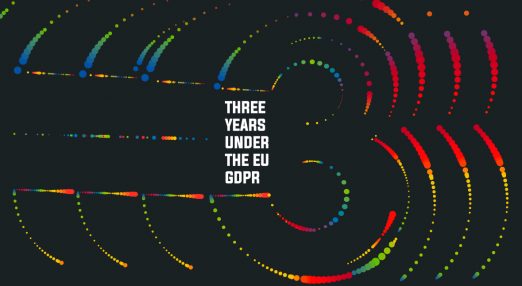
EDRi-gram, 2 June 2021
The GDPR is still in its infancy, and while it is too soon to consider revisions to the law, EU regulators and decision-makers have the power to improve enforcement and fulfil its promise for vindicating data protection rights and spurring the development of privacy-protecting business models. The past three years hold important lessons for decision-makers and regulators to leverage to deliver on that promise. A lot is at stake.
Read more
-

EDRi-gram, 19 May 2021
The increasing use of facial recognition and other biometric surveillance technologies – on our streets, in train stations, at protests, at sports matches and even in our global ‘town square’, Facebook – means that our freedom to be anonymous in public spaces, our freedom to just be, really does face an existential threat. The mask is a symbol of resistance against the growing use of mass facial recognition. Get this symbolic merch and support the work EDRi does.
Read more
-

EDRi-gram, 5 May 2021
The shady AdTech business model used by Big Tech targets mothers who just had stillbirths with baby ads, and serial gamblers who are trying to quit with gambling ads. EDRi is working to create a better digital future, where people are put before profit. Will you donate to us to help make that happen?
Read more
-

EDRi-gram, 22 April 2021
Issues of non-discrimination and fundamental rights would have to be at the core of the approach to artificial intelligence, rather than considered after competition and industrial policy. A truly people-centred AI regulation would take a step back and acknowledge the inherent harms AI will perpetuate if deployed for certain purposes.
Read more
-
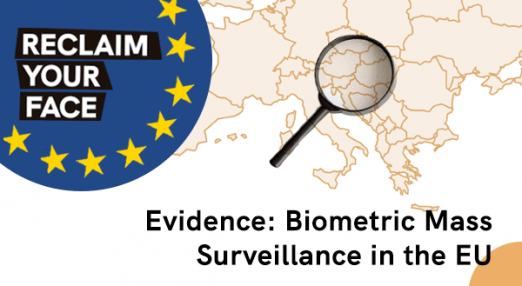
EDRi-gram, 7 April 2021
Reflecting on the increased challenges to our digital rights, we realised how imperative it is that the field truly reflects everyone in European society. This means improving representation in the digital rights field, but more crucially undoing the power structures preventing us from protecting digital rights for everybody. Approaching digital rights through the lens of decoloniality invites us to interrogate how digital space is occupied, the people who are displaced, and the mechanisms of extraction it requires to exist. This process requires extra work, extra care, extra patience, extra humility as we interrogate that what seems natural.
Read more
-

EDRi-gram, 24 March 2021
Human rights mustn’t come second in the race to innovate, they should rather define innovations that better humanity. The European Commission’s upcoming proposal may be the last opportunity to prevent harmful uses of AI-powered technologies, many of which are already marginalising Europe’s racialised communities.
Read more
-

EDRi-gram, 10 March 2021
Unless we take strong action, people in Europe could soon face the end of our privacy and anonymity in public spaces as we know it. We need to rise against the growing use of sinister, unnecessary and disproportionate technologies in our public spaces which abuse our faces. 34,000+ incredible supporters have already joined the fight by officially signing our formal “European Citizens’ Initiative”. Help us reach one million signatures by spreading the word, mobilising your friends and family and even writing to your national or European Parliamentary representatives.
Read more
-
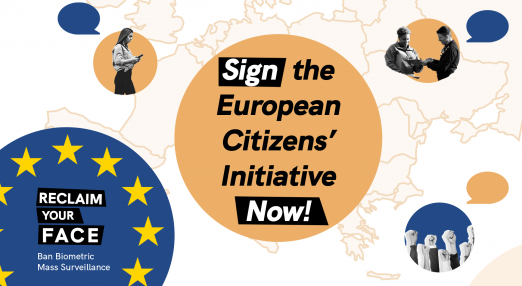
EDRi-gram, 24 February 2021
For years, the EDRi network has exposed how people’s most sensitive identifying characteristics like our faces, fingerprints or the way we walk are unlawfully harvested on an industrial scale by European governments and corporations to make unfair judgements about us without our knowledge. Now, with the launch of our Reclaim Your Face campaign’s European Citizens’ Initiative, we are increasing the pressure on lawmakers to put our rights ahead of big businesses’ profits.
Read more
-

EDRi-gram, 10 February 2021
This edition of the EDRi-gram is jam packed full of national and European insights and examples on how our data and tech is being misused by those in power and what we must do about it! In this edition we showcase another example of how governments in Europe are using discriminatory biometric technologies against marginalised groups. We expose how Big Tech continues to make big profit by expanding into the public sphere, share why breaking encryption would hurt children and adults alike and much more.
Read more
-
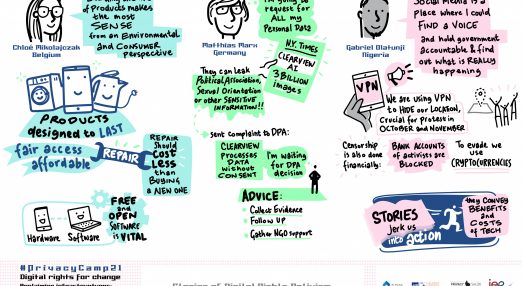
EDRi-gram, 27 January 2021
We hope many of you were able to join us at Privacy Camp 2021 yesterday which brought together 245 academics, activists and privacy experts from across the world. Stay tuned for the key takeaways. In this edition of the EDRi-gram we showcase the mobilisation efforts and victories so far from the #ReclaimYourFace campaign, share Privacy International's research on political ads and much more.
Read more
-

EDRi-gram, 13 January 2021
How can digital rights best contribute to reclaiming infrastructures, and how can reclaimed infrastructures sustain democratic practices, for a fair, people-centered, digital future in the EU? Join us at Privacy Camp 2021 to find out: https://privacycamp.eu/
Read more
-

EDRi-gram, 9 December 2020
In this final 2020 edition of the EDRi-gram, our wish is to start 2021 with more energy, momentum and resources to protect our rights and freedoms online. Would you consider donating to help make that happen?
Read more
-

EDRi-gram, 25 November 2020
On 12 November 2020, 12 organisations from across the EDRi network launched the first ever pan-European civil society movement against biometric mass surveillance: Reclaim Your Face. Over 10 000 people signed the petition so far. Join us!
Read more
-
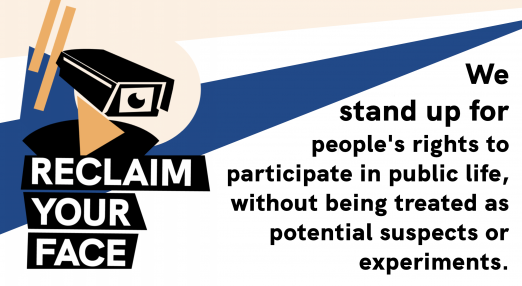
EDRi-gram, 12 November 2020
We have watched as governments have abused their power to put limits on people’s freedoms, and as companies have exploited the situation to gather ever more biometric data about us. The Reclaim Your Face coalition has risen up against the widespread abuse of our biometric data before and during the pandemic.
Read more
-

EDRi-gram, 28 October 2020
Data brokers are key actors in the hidden data ecosystem. The data they collect and later sell can be used for a range of different purposes, from commercial advertising to political campaigning, and in some worrying instances, law enforcement.
Read more
-
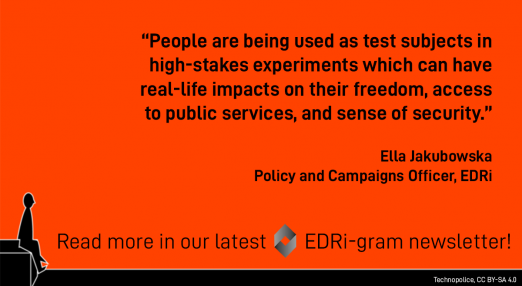
EDRi-gram, 14 October 2020
The public are being treated as experimental test subjects: across these examples, it is clear that members of the public are being used as subjects in high-stakes experiments which can have real-life impacts on their freedom, access to public services, and sense of security.
Read more
-

EDRi-gram, 30 September 2020
"Biometric mass surveillance is tremendously invasive and inhumane. It allows an invisible, permanent and massive control of the public space. It makes everybody a suspect. It turns our face into a tracking device, rather than a signifier of personality, eventually reducing it to a technical object."
Read more
-

EDRi-gram, 16 September 2020
"Structural racism appears in policy areas from health, employment to climate. It is increasingly clear that digital and technology policy is also not race-neutral, and needs to be addressed through a racial justice lens."
Read more
-
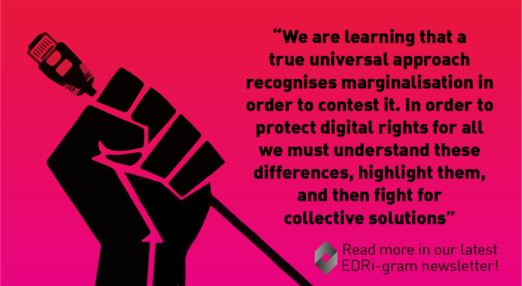
EDRi-gram 18.13, 8 July 2020
"We are learning that a true universal approach recognises marginalisation in order to protect it. In order to protect digital rights for all we must understand these differences, highlight them, and then fight for collective solutions"
Read more
-

EDRi-gram 18.12, 24 June 2020
"Digital sovereignty means building infrastructures, helping create services, funding research and supporting critical civil society"
Read more
-
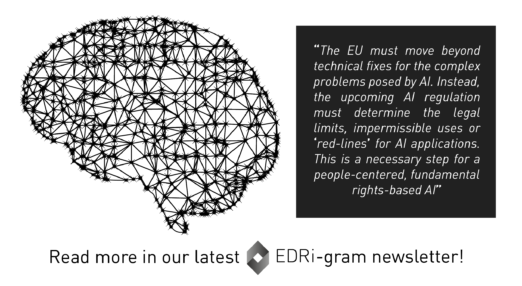
EDRi-gram 18.11, 10 June 2020
"The EU must move beyond technical fixes for the complex problems posed by AI. Instead, the upcoming AI regulation must determine the legal limits, impermissible uses or "red-lines" for AI applications. This is a necessary step for a people-centered, fundamental rights-based AI"
Read more
-

EDRi-gram 18.10, 27 May 2020
"A collective vision of privacy means contesting ramped-up police monitoring and the use of marginalised groups as guinea pigs for new digital technologies, as well as ensuring new technologies have adequate privacy protections."
Read more
-

EDRi-gram 18.9, 13 May 2020
"The use of biometric surveillance systems creates a dynamic where the powerful watch and the powerless are watched"
Read more
-

EDRi-gram 18.8, 29 April 2020
"The upcoming Digital Services Act (DSA) must address the issue of political microtargeting. It is a once-in-a-decade chance to correct the power imbalance between platforms and user."
Read more
-

EDRi-gram 18.7, 15 April 2020
"What can the experiences of the UK, Poland and Hungary teach states about how to stop the spread of coronavirus - without leaving the door ajar for future fundamental rights violations to creep in?"
Read more
-

EDRi-gram 18.6, 1 April 2020
"EDRi supports necessary, proportionate measures, fully in line with national and international human rights and data protection and privacy legislation, taken in order to tackle the COVID-19 pandemic"
Read more
-
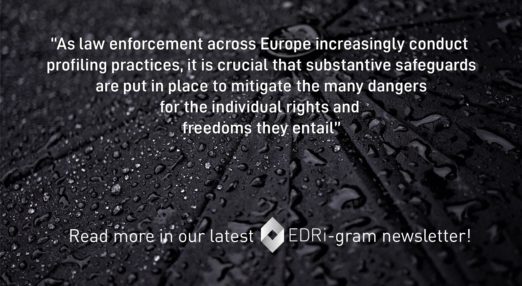
EDRi-gram 18.5, 11 March 2020
"As law enforcement across Europe increasingly conduct profiling practices, it is crucial that substantive safeguards are put in place to mitigate the many dangers for the individual rights and freedoms they entail"
Read more
-

EDRi-gram 18.4, 26 February 2020
"The requirement of a notification seems to be out of the question for those advocating for "efficiency" of cross-border criminal investigations, even if that means abandoning the most basic procedural safeguards"
Read more
-

EDRi-gram 18.3, 12 February 2020
"We have to ask ourselves what kind of a world do we want to create, and who actually benefits from the development and deployment of technologies used to manage migration"
Read more
-

EDRi-gram 18.2, 29 January 2020
"We've all heard the saying: 'If the product is free, then you're the product'"
Read more
-

EDRi-gram 18.1, 15 January 2020
We analysed three increasingly common uses of facial recognition: tagging pictures on Facebook, automated border control gates, and police surveillance"
Read more
